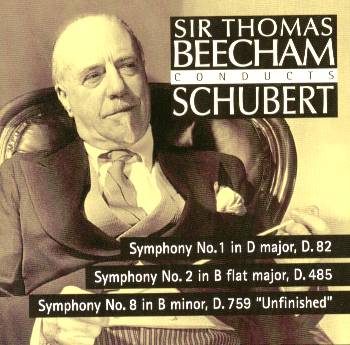Beecham’s tours during 1909-10 with his eponymous symphony
orchestra gave him the opportunity greatly to expand his repertoire.
In this way for example – and this is but one example amongst many –
he first conducted a selection from the Nutcracker (which incidentally
makes an appearance in the same recent batch of Sony/Beechams as this
one). So too the Schubert Unfinished which he first conducted
in Bedford in October 1909. The first two symphonies however were performed
as run-throughs for the projected CBS recordings and whilst he did play
both a few times after the1953 recording sessions they were almost immediately
dropped from his active repertoire – as he’d dropped No. 4 after a single
performance. Whilst his reluctance – or unwillingness – to record No.
4 is understandable it’s surprising that the only other symphony he
didn’t commit to a commercial recording was No. 9.
I greatly enjoyed his Unfinished. Familiar orchestral
virtues are prominently on display – the depth but not saturation of
the basses, the brass punctuation - punctilious over attack and note
values – and the consequent contrast between affectionate string phrasing
and piercing declamation. The overlapping wind lines are given an exquisite
freedom and tension is conveyed through an intense concentration. Running
pizzicati with just the right weight drive the musical argument onwards
and the sense of tragically incipient direction is never far away but
equally never overplayed. In the Andante con moto one again encounters
Beecham’s delicacy with string shaping and most admirable is the way
he carefully measures the rise and fall of the supportive violins beneath
Jack Brymer’s clarinet line (note the precision and immediacy of the
diminuendi he asks for in the lower strings). All the woodwind principals
are on richly verdant form but when Beecham shows his implacable face
it is full of unyielding starkness. But above all what one relishes
is the naturalness of the phrasing, its ebb and flow and the meticulous
care that must have gone into the marking of parts. I’m not sure if
the very bad edit at 10.24 in the Andante was present on the
LP but it does rather leap out here.
The First Symphony was grist to Beecham’s mill; it’s
a charming confection and Beecham plays up to it with invincible adroitness.
The woodwind inflections in the first movement are quite splendid and
Beecham lacks nothing in authoritative drive. The refinement of string
tone in the Andante is an accustomed luxury (but doesn’t he lop
off some bars here? The notes don’t say). My only real cause for concern
would be his tempo for the Minuet, which might be too languid for some
tastes (and the effect is to make perhaps too similar the prevailing
tempi for both Andante and Minuet). Otherwise the Finale
is really splendid and strong. The B flat major symphony receives an
equally satisfying reading and is beautifully performed. Here his Minuet
is properly fleet of foot and if the finale may lack a whisker of adrenalin
it lacks for nothing in terms of finesse.
Beecham and Schubert generally made for the most congenial
of companions and this Sony disc proves the point. Lyricism and care
were the watchwords – the lyricism is generally taken for granted but
the care all too often overlooked.
Jonathan Woolf
see also Review
by Robert Hugill
Complete
list of CBS Beecham recordings

